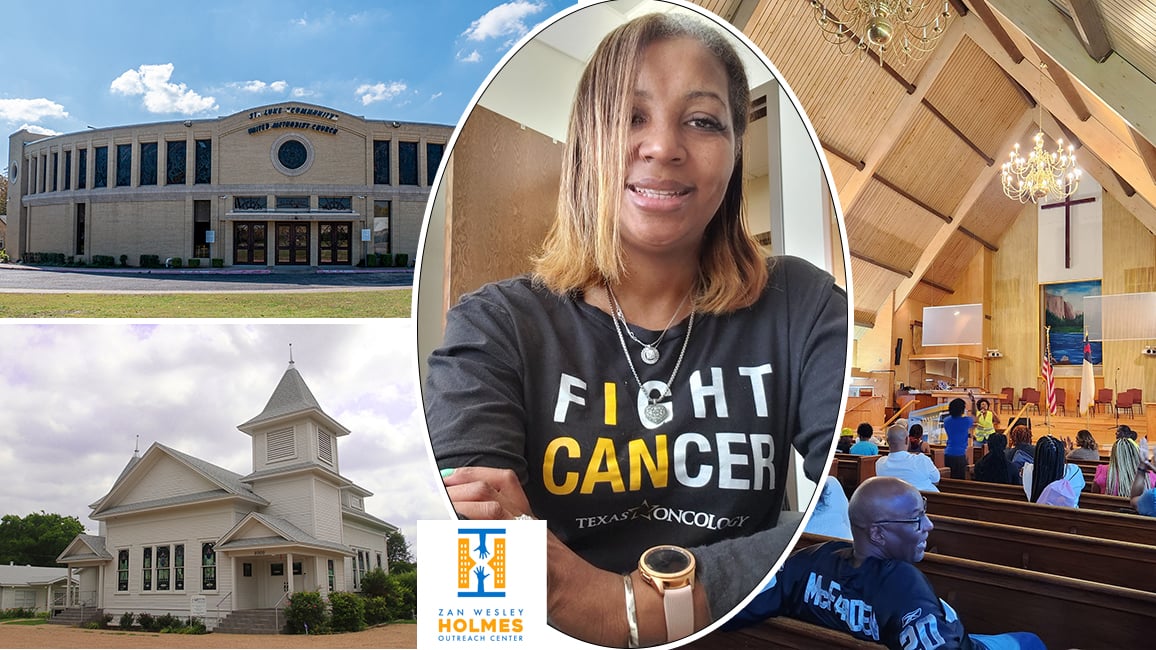Faith Community Nursing Brings Mental Health Resources to NTC
Catinna Mallett will be helping the people at (clockwise from upper left) St. Luke “Community” UMC, Salem Institutional Baptist Church, the Zan W. Holmes Community Outreach Center and Wheatland UMC.
Partnership between NTC Center for Missional Outreach, the Golden Cross Foundation and Methodist Health System launches in three Dallas churches
July 17 marked a new day for Faith Community Nursing in North Texas. Registered Nurse Catinna Mallett began her full-time role at three churches in the southern sector of Dallas with a special emphasis on mental wellness.
Through a generous grant from the Golden Cross Foundation and a partnership with Methodist Health System, Mallett will serve at St. Luke “Community” United Methodist Church and the Zan W. Holmes Community Outreach Center, Wheatland United Methodist Church and Salem Institutional Baptist Church. The grant covers her salary and program expenses for three years.
Debbie Seider established the Faith Community Nursing program at Methodist Health more than 20 years ago and is excited to help expand its work with the hiring of the first nurse to focus on mental wellness, as well as the overall health of the congregations.
“Faith Community Nursing is part of the Pastoral Services Department at Methodist Health System and was created in 1999 to intentionally address whole-person health in the health system’s service area while minimizing barriers of access to healthcare,” Seider explained. “By developing partnerships and covenant relationships with local faith communities, Faith Community Nursing offers education, mentoring, assessments, resources and other services to members of those faith communities, as well as to their larger parishes.”
Said Mallet: “At the core of nursing is service, to provide competent and compassionate care, to respect and support those who have been assigned to my care. This initiative, provided by the grant from Golden Cross, is allowing me to be of service on a larger scale. The biggest and main difference in this setting is 'faith in God' is the center.”
Mallett is particularly passionate about bringing a mental health component to her work.
“The well-being and overall health of the congregation and community they serve is important, especially mental health. Without our mind, who are we? It is the renewing of our minds that transforms us,” she said. “A grand impact can be made if mental health can be addressed, resources can be available and accessible to those who need it. The church is a hospital, it is for those who are sick. Because we are followers of Christ, we are reaching out to help those in need - physical, mental and spiritual, we must address them all.”
In 2021 in response to the growing needs around mental wellness, the NTC Center for Missional Outreach gathered a working group of clergy and laity, including mental health professionals, to examine how churches can support the mental health and overall well-being of their communities. A key recommendation was to prioritize funding for mental health professionals to be based in churches. Golden Cross Foundation and Methodist Health System were natural partners in this effort.
“Working together in this way helps the churches to move into being healthy, and it helps the pastors to bring the best in science into the spiritual community,” said Rev. Caesar Rentie, vice president of pastoral services for Methodist Health System. “One of the things I love about Methodist Hospital is it has a rich history of almost 100 years in North Texas and a close connection to the UMC. This is a way to bring that collaboration between healthcare and the United Methodist churches together so that the church becomes a model of wellness and health and presents that to the community. If the church is healthy, then the community will be healthy.”
While churches cannot do the work of mental health professionals, they can help reduce the stigma surrounding emotional and psychological wellbeing. Rentie recognizes the possibilities when churches empower congregation members to embrace their humanity and ask for help when they need it.
“This is a wellness model, not sickness,” Rentie said. “It’s not about when the house is burning, but what do we need to do to keep the house in order.”
A priority for Mallett will be offering mental health first aid training for the congregations she serves, equipping church members to support others in times of need, especially when mental health concerns have been on the rise.
“Due to the challenges of the last three years, individual, family and community mental wellness has been adversely affected,” Seider noted. “Within the framework of the Model for Healthy Living, the Faith Community Nurse can assess, address and refer as necessary to help individuals and families regain equilibrium, develop healthy coping skills and move toward growth and flourishing. Knowing that mental health challenges do not exist separately from other areas of life, the focus of the nurse will include a whole person approach toward health and wellness — body, mind and spirit.”
As she looks ahead to the next three years of service in churches in South Dallas, Mallet describes her hope for the program: “My hope is that each church will know and understand the difference they can make in the lives of the people they serve. Lifelong connections and collaborations made that will create resources, solutions and safe spaces. Relationships will be built or strengthened so conversations can happen with people they trust. The congregation and community will be active participants, that they will recognize the benefit of taking part, that it will have a positive impact in their life and lifestyle. Lives will be changed and, they will be saved.”
Published: Saturday, August 12, 2023

